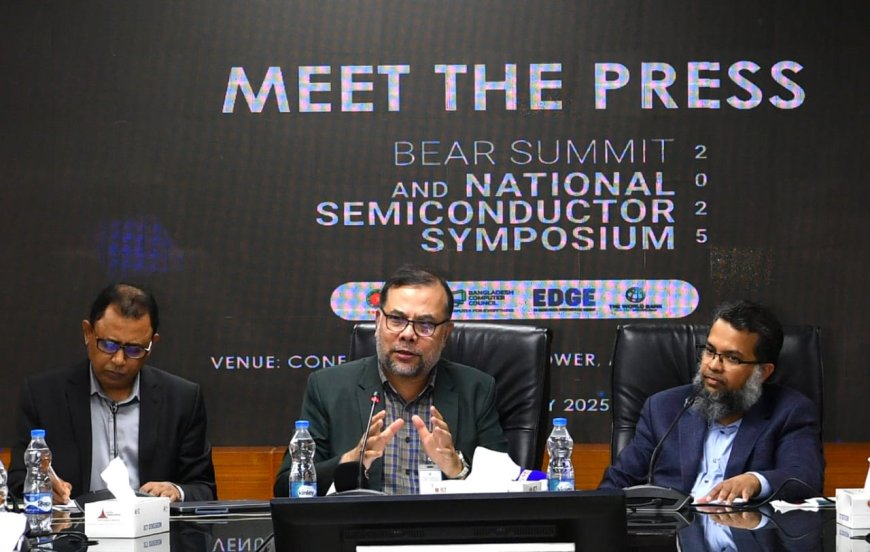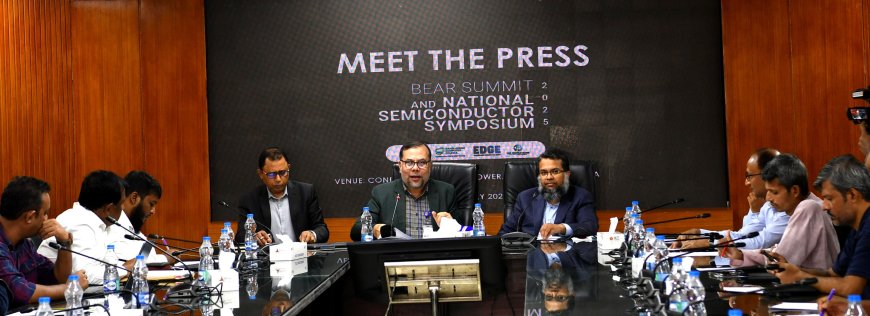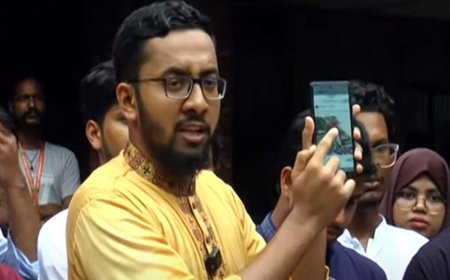Bangladesh’s First ‘BEAR’ Summit to Spotlight Semiconductor Strategy and Innovation

On Wednesday, July 16, the National Science and Technology Complex in Dhaka will host the first-ever BEAR Summit 2025, focusing on Biotechnology, Electronics, Artificial Intelligence, and Robotics. Coinciding with Shaheed Abu Sayeed Day, the two-day National Semiconductor Symposium will bring together top-tier Bangladeshi-origin professionals working in global semiconductor giants such as MediaTek, SK Hynix, SanDisk, GlobalFoundries, Tokyo Electronics, and InnoVex.
More than 250 students from various Bangladeshi universities, alongside academics, policymakers, and industry leaders, are expected to participate. According to statistics shared at a press conference on Tuesday at the ICT Tower in Dhaka, 60 percent of attendees will be students and 40 percent teachers and industry experts. About 30 percent of international speakers are set to join virtually. A video message in the inauguration will emphasize “national innovation and social movements in the semiconductor sector.”

Presided over by ICT Secretary Shish Haider Chowdhury, the press conference was addressed by the summit’s convener, Professor Dr. Mohammad Mostafa Hossain of Purdue University. He remarked, “This summit is being organized from a sense of responsibility toward the martyrs and participants of the July uprising. Rather than succumbing to brain drain or limiting ourselves to ‘chip jobs,’ we want to foster indigenous leadership in semiconductors through innovation and capability. I’m very optimistic about this.”
He added, “Nine experts from the world’s top five universities have already confirmed their participation, along with prominent semiconductor industry specialists. All local semiconductor entrepreneurs will also join. Our goal is not monetary investment but leveraging expert knowledge, innovation, and policy support to elevate the national semiconductor sector.”
The summit has already received over 300 poster and live demo submissions, which Dr. Hossain believes will reflect this vision. “We want this symposium to lay the foundation for a national technology strategy and establish an IP office that can channel youth innovation,” he said.
Answering journalists’ questions, ICT Secretary Shish Haider Chowdhury explained that the event, one of the largest of its kind, is being organized on a minimal budget with financial support from the World Bank, through the ICT Division’s EDGE Project under the Bangladesh Computer Council. “This is the beginning of something much bigger,” he said. “Even if 250 register, we only have room for 150 students based on current resources.”
The summit will be inaugurated by the Special Assistant to the Chief Adviser, Faiz Ahmad Taiyeb.
The ICT Secretary also highlighted the growing relevance of AI and robotics. “This summit has attracted not only experts but also political leaders who are committed to advancing the agenda,” he said. “We are set to publish the final national policies on AI and personal data protection next month.”
He reiterated the government's recommendations to support the semiconductor sector with 10–15 years of tax holidays, import duty exemptions, special bonded warehousing, fast-track customs clearance for shipments, and 5–10 percent cash incentives on exports.
Other speakers at the press briefing included Dr. Mohammad Mehedi Hasan, Executive Director of Bangladesh Computer Council, and Dr. Mahbub Rashed, Vice President of World Founders and a semiconductor expert.









































































































































































































